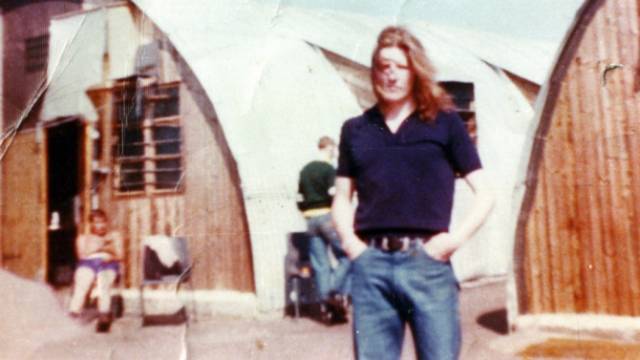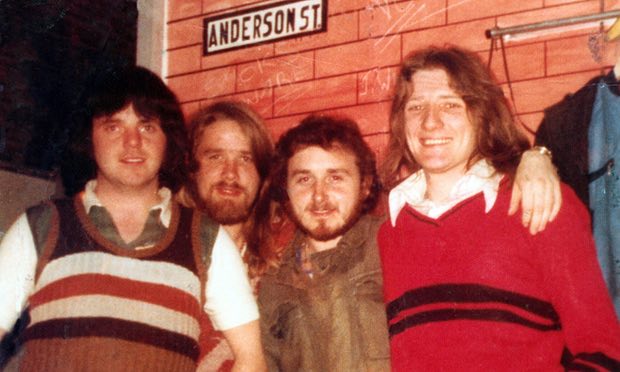
 Brendan J. Byrne’s documentary Bobby Sands: 66 Days, shines new light on the IRA martyr who died at age 27, while imprisoned, after a hunger strike which sought to change the way in which he and his fellow inmates were treated by the British government. Sands argued that rather than being treated as common criminals, they should be seen as political prisoners. The gripping documentary uses an array of cinematic tools to convey the fight of Sands and the IRA, while also contextualizing how they fit within the larger scheme of British politics. I spoke to the director about how he came up with the structure, and how Sands made sense to some based on their faith.
Brendan J. Byrne’s documentary Bobby Sands: 66 Days, shines new light on the IRA martyr who died at age 27, while imprisoned, after a hunger strike which sought to change the way in which he and his fellow inmates were treated by the British government. Sands argued that rather than being treated as common criminals, they should be seen as political prisoners. The gripping documentary uses an array of cinematic tools to convey the fight of Sands and the IRA, while also contextualizing how they fit within the larger scheme of British politics. I spoke to the director about how he came up with the structure, and how Sands made sense to some based on their faith.
Why did you want to make this movie?
I grew up in Belfast, Bobby Sands was a big name, I was only 15 in 1981 and used to see on my way to school a wall with his name. I was very young and didn’t fully understand what was going on, I used to see the protests when I rode the school bus. When I became a filmmaker and the 35th anniversary of his death was coming, I realized he was a big figure who I didn’t know much about, other than the hunger strike. I thought Hunger was a great film, and liked the exploration of someone who chooses to die for something they believe in, it was an experiential film, but I needed to know the why. Where he came from, why did he ask this organization to back him up on something they didn’t want him to do, why he was politicized...the most important thing was trying to understand an icon of where I grew up.
In your research what was the thing that most surprised you about him?
His diary because it showed he was a thinker. He decided to do this against the will of the army, I felt I saw somebody who was ahead of his time, who was trying to bring the IRA with him. Bobby Sands knew the war could only be won at the frontline of the battlefield which for him was the prison cell where he was wrongfully imprisoned. The IRA and Republicanism eventually caught up with him. He didn’t say “I’m the leader”, he showed it in a quiet way.
Since you were a kid when this happened did making the film shine a light on events in your own life around that time, that you understand until now?
I think since I was 15 and not 18 for instance, I didn’t get involved in the protests because I was under the dutiful guidance of my parents. As I look back I realize we were having a war here, it wasn’t Aleppo, Palestine or Gaza, buildings weren’t being destroyed, but there was fear, bombings, it must have been a hard time to raise a family. Those were difficult times to live through, in many ways I was shielded from many things.
Has this changed in any way your perception of when parents should get their children involved in politics?
I think in those times if you were a particular age and were going through teenage rebellion, children would’ve been swept up in their own emotions and perception. As a parent myself I have felt some duty, so that the generation without the baggage of that political history can understand what their parents went through, and also be grateful because they live in a period of peace. I want to give them the opportunity to see the basis of the country they live in, we still live in a divided society, people aren’t killing each other, but there are many divisions and our children live with that legacy. I don’t want my children to inherit my views, I want them to make their own.
 Has it been strange to show your film in a world where the right has once again taken hold of power?
Has it been strange to show your film in a world where the right has once again taken hold of power?
I was in New York for the premiere and what was powerful about being in the audience, 48 hours after NYC was coming to terms with Donald Trump’s win, there was a sense of palpability in the room as audience members became familiar with someone who took a stand for the greater good of his countrymen. In a room in a city coming to terms with the country electing a showman, someone who is only out to look for himself, I think there was a powerful moment when they saw someone who really believed in something so much. I think the audience felt a sudden additional bankruptcy in their democracy, they would have rather taken Bobby Sands home than Donald Trump.
I’m sure the audience was also so involved because of the film’s ingenious structure. How did you come up with that?
We had the 66 days structure, I knew we’d have to go back in time to paint the 100 year history of British and Irish democracy, and things like the history of hunger strikes. Something that unified the structure was that there isn’t a single moving picture image of Bobby Sands that exists, not one. There’s very little archive from the prisons, so I knew we’d need some reconstructions over which we could play the narration. Animation was key to help us get into Bobby’s head too, it also gave the film a more ethereal feel, taking it beyond the realms of traditional documentary.
Even though I knew Bobby Sands’ history I had never made the Jesus Christ connection your movie makes. We see how in a way he inspired blind faith in others by being true to his ideals. We see people putting their trust in someone they never meet or see, was the movie in any way an exercise in trying to understand how faith works?
I grew up in the Catholic tradition here, I don’t think I was exploring blind faith, but I was exploring how you draw people to your cause. Something we wanted to touch on which you picked up, is that the Protestant tradition didn’t understand the hunger strike, they couldn’t understand why a young Irishman would starve himself to death, almost naked in a prison cell. That’s because the nature of the Protestant faith is about an individual’s relationship to God, while Catholicism is more about Jesus and a notion of an adherence to a Christ-like figure, so Catholics understood subliminally what Bobby Sands was doing. Catholics who didn’t support the IRA understood at the basic level that Jesus Christ himself starved in the desert for 40 days, or that he was almost naked when he was crucified. They were aware of the connotations of it all, because the Catholic chaplains were nervous of losing control of the population at this tumultuous time and were using those terms to describe what was going on with the prisoners in jail.
Bobby Sands: 66 Days is now in theaters.